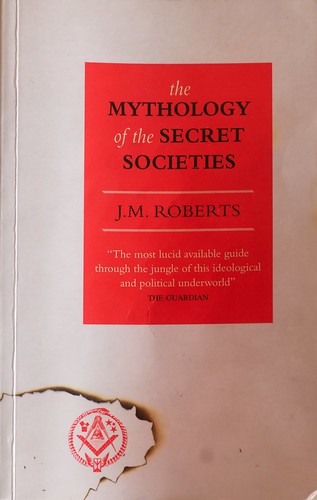The Mythology of the Secret Societies
Though sometimes amusing, it is always disturbing when intelligent people seriously talk nonsense.This is the opening sentence of J.M. Roberts'
The Myhology of the Secret Societies. He then goes on to point out an impressive array of nonsense spouted by generally intelligent people. As the title suggests, it is not so much an investigation into the secret societies themselves as into what people have believed about secret societies.
It is a historical investigation of where the idea (and the fear) of a world-encompassing conspiracy comes from. Because the history of this myth is tied up with the history of the secret societies themselves, however, the book offers a very interesting overview of their development and interaction, especially in the latter half of the 1700s and up to the middle of the 1800s. It is an attempt to deal academically with a subject which has been left to conspiracy theorists for so long that it has itself become tainted. And it deals with this by focusing on the origins of those theories themselves, and thereby isolates the historical germ from the myth, at the same time discussing the particular historical situations which spawned both.
It traces the origins of Freemasonry (the movement from "operative" Freemasonry (where the Masons were still guilds of masons) to the "speculative" (where they were not), for example), shows how Scottish Freemasonry was invented in France (oh, yes), and became increasingly nuttier as time went on (while English Freemasonry, according to Roberts, remained fairly sedate and respectable).
It also shows how other societies (like the Illuminati and Carbonari) made use of the Freemasonry framework, to the extent of taking over some lodges from within. And how the revelation of this is at the heart of the general paranoia which surrounds secret societies. It then shows how the fear of a political secret society becomes one of the primary inspirations of those who finally create them in response to state oppression. It investigates quite closely the causes of the Illuminati panic and the claim that Freemasons orchestrated the French Revolution.
I picked up this book primarily to get a clearer idea of what Freemasonry is all about, and what separates it from societies like the Illuminati and the Carbonari. And it worked: what used to be a dark muddle of vaguely related societies or organisations is now a slightly lighter muddle of vaguely related societies and organisations. And the muddle at this point is not solely down to my brain.
It turns out that the people who have been fascinated by secret societies and wanted to join them have tended to want to join all of them at once. Or sometimes one after the other. The suggestion of secret knowledge is a powerful one, as I suggested in
an earlier review, and the simple fact that one secret society failed to reveal anything astonishing did not necessarily discourage those who were drawn by the promise. And people who have wanted to found a secret society, for one reason or another, have drawn on the knowledge of earlier ones.
Roberts' conclusion, however, is that the only power of secret societies have been in the legends they created; in terms of direct influence, they have been either uninterested or incompetent.
The central concern of Roberts is the structure of conspiracy theory, and what aspects of the Mason legend (and the others) make the conspiracy so powerful. He lifts out the belief in secret superiors (who direct those below them without giving them full access to the reasons for the actions they undertake), the idea of inner secrets (the true knowledge or plan), as well as the precedent of the Illuminati attempt to infiltrate and take over Freemason lodges in order to further their Enlightenment agenda (very sinister, that Enlightenment agenda).
More startlingly, he shows the continuity between the conspiracy theories which fear Masons and Illuminati and Carbonari, and those who include an anti-Semitic twist. If that is not enough, reading this book in the lead-up to Breivik's trial in Oslo made it very clear to me how potent the thought structures of the conspiracy mindset can still be.
This is, I think, the non-fiction equivalent to Umberto Eco's
Foucault's Pendulum. Both should be read by anyone who at any time figured the Illuminati might be running the world, or that that Dan Brown might be on to something. And of course by all you other, sensible people.


Comments